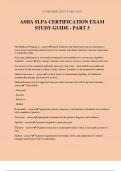©THEBRIGHTSTARS 2024
ASHA SLPA CERTIFICATION EXAM
STUDY GUIDE - PART 3
The Medicaid Program is - answer✔jointly funded by the federal and state governments to
assist states in providing medical care to low-income individuals and those who are categorized
as medically needy.
Each state administers its own medicaid program and establishes its own income eligibility
standards; - answer✔type, amount, duration, and scope of services covered, and payment rates.
For services to be considered medically necessary, they must - answer✔be reasonable and
necessary for the treatment of illness, injury, disease, disability, or developmental condition.
Medical necessity is - answer✔a critical factor for determining eligibility for Medicaid-
reimbursable therapy and treatment services.
Medicaid claims may be supported when providers document the following basic elements: -
answer✔- Reasonable
- Necessary
- Specific
- Effective
- Skilled
Reasonable: - answer✔Appropriate amount, frequency, and duration of treatment in accordance
with standards of practice
Necessary: - answer✔Appropriate treatment for the patient's diagnosis and condition
Specific: - answer✔Treatment targeted to particular goals
Effective: - answer✔Treatment expected to yield improvement within a reasonable amount of
time
Skilled: - answer✔Treatment requiring the knowledge, skills, and judgement of a speech-
language pathologist (SLP) or audiologist
, ©THEBRIGHTSTARS 2024
Audiology and speech-language pathology services are medically necessary to treat -
answer✔speech-language, hearing, balance, swallowing, voice, fluency, and cognitive-
communication disorders.
Children who require services as part of their individualized education programs (IEPs) and are
identified as having a disability under the Individuals with Disabilities Education Act (IDEA) are
- answer✔also generally considered to have met the requirements for services to be medically
necessary.
Although each state established a state plan, including specific requirements, relevant
documentation for establishing medical necessity may include: - answer✔- medical history,
such as pertinent medical history, brief description of functional status, and relevant prior
treatment;
- diagnosed speech, language, swallowing, hearing, or balance disorder;
- identification of a child with a disability as eligible for services under the Individuals with
Disabilities Education Act (IDEA) or determination by an IEP team that services are required;
- date of onset;
- physician referral, if required (reauthorization may be required);
- initial assessment and date - the procedure(s) used by the audiologist or SLP to diagnose a
speech, language, voice, fluency, cognitive-communication, swallowing, hearing, or balance
disorder and the date the initial assessment is completed;
- plan of treatment or a treatment program and date established; and
- progress notes and/or reports
Professionals may work with their state association leadership, local education agencies, state
education agencies, and state Medicaid offices to address specific topics or questions. Successful
efforts to improve efficiency for professionals in some states include: - answer✔- streamlining
paperwork;
- establishing evaluation or IEP by a qualified professional as adequate to establish medical
necessity and eliminating need for physician signature
- expediting physician referral and examination process;
- clarifying medical necessity criteria and documentation requirements;
- updating states policy and procedure information
- advocating for services not covered (i.e., private practice and telepractice)
A "speech pathologist" is an individual who meets one of the following conditions: - answer✔i.
Has a certificate of clinical competence from the American Speech and Hearing Association
, ©THEBRIGHTSTARS 2024
ii. Has completed the equivalent educational requirements and work experience necessary for the
certificate
iii. Has completed the academic program and is acquiring supervised work experience to qualify
for the certificate
A "qualified audiologist" means an individual with a master's or doctoral degree in audiology
that maintains documentation to demonstrate that he or she meets one of the following
conditions: - answer✔i. The State in which the individual furnishes audiology services meets or
exceeds State licensure requirements in paragraph, and the individual is licensed by the State as
an audiologist to furnish audiology services.
ii. Have a Certificate of Clinical Competence in Audiology granted by the American Speech-
Language-Hearing Association.
A. Have successfully completed a minimum of 350 clock-hours of supervised clinical practicum
(or is in the process of accumulating that supervised clinical experience under the supervision of
a qualified master or doctoral-level audiologist); performed at least 9 months of full-time
audiology services under the supervision of a qualified master or doctoral degree in audiology, or
a related field; and successfully completed a national examination in audiology approved by the
Secretary.
There are five conditions that must be met for Medicaid to reimburse for IDEA-related services -
answer✔1) the child receiving the service must be enrolled in Medicaid
2) the services are medically necessary
3) the services must be covered in the state Medicaid plan or authorized by the federal Medicaid
statue
4) the services must be listed in the child's individualized education program (IEP)
5) the school district or local educational agency (LEA) must be authorized by the state as a
qualified Medicaid provider
Medicaid does not pay for screening services that are - answer✔provided free of charge to non-
medicaid beneficiaries in schools.
According to the School-Based Administrative Claiming Guide, - answer✔if the screening
leads to a child being identified as having a disability under the IDEA and the development of an
IEP, Medicaid could pay for services provided in the IEP.
The most common differences between state Medicaid programs include - answer✔group size
limits, documentation requirements, supervision requirements, and provider requirements. There
may also be differences related to documentation for services provided "under the direction of" -
including "sign off" by qualified personnel- and the payment rates for school-based providers.




